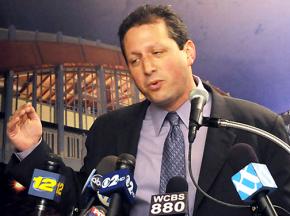The liberals who defend Israeli apartheid
, the co-host of Radio Free Eireann on WBAI in New York City, was active in the anti-apartheid movement with the New York Area Labor Coalition Against Apartheid and the American Committee on Africa. Here, he comments on the campaign by pro-Israel political and media figures against a forum on solidarity with the Palestinian struggle.
A FORUM on the boycott, divestment and sanctions (BDS) campaign against Israel, featuring Palestinian author and activist Omar Barghouti among other speakers, took place on February 7 at Brooklyn College in New York City despite a fierce campaign of political leaders and the media establishment to silence supporters of Palestinian rights.
The crusade to shut down the Brooklyn College forum tells us a lot about the attitudes of both mainstream parties in the U.S.--above all that defense of Israel from all critics is still the default position, including among many Democrats who are considered quite liberal.
In the week before the forum, members of the New York City Council threatened to cut off Brooklyn College's funding because its Political Science Department was cosponsoring the event.
Lew Fidler, the City Council assistant majority leader, released a letter from 10 council members stating, "We do not believe this program is what the taxpayers of our City--many of whom would feel targeted and demonized by this program--want their tax money to be spent on We believe in the principle of academic freedom. However, we also believe in the principle of not supporting schools whose programs we, and our constituents, find to be odious and wrong."

Fidler's threats backfired badly. Not only did the Political Science Department refuse to back down, but he was publicly rebuked by New York Mayor Michael Bloomberg and prominent Zionists including Harvard Law School Professor Alan Dershowitz--though Dershowitz denounced the college for allegedly refusing to hold a meeting critical of BDS. Two of the original signers took their names off the letter.
Earlier, 19 of New York's most liberal--they described themselves as progressive--Democratic politicians, including the leading Democratic candidates for mayor, launched a far more substantive attack on the Brooklyn College meeting. They objected to the Political Science Department promoting a discussion of BDS. "We collectively believe that the BDS movement is a wrongheaded and destructive one, and an obstacle to our collective hope for a peaceful two-state solution."
The statement was apparently initiated by Brad Lander, one of the most liberal City Council members. Lander represents Brooklyn's Park Slope, an area where Republican candidates often come in third behind the Green Party.
THE PROBLEM for Lander and his colleagues is that it is Israel which has been blocking a "peaceful two-state solution." The statement on the Brooklyn College meeting came barely two months after Israel announced plans for new settlements in the occupied West Bank that the New York Times said "could prevent the creation of a viable, contiguous Palestinian state."
Israel plans to bring 3,000 new settlers into the area known as E1, which would cut the West Bank in half, permanently dividing Jerusalem--which would be the capital of a new Palestinian state--from West Bank cities like Ramallah, Hebron and Bethlehem.
The Obama administration would only murmur its disapproval. Then-Secretary of State Hillary Clinton said "These activities set back the cause of a negotiated peace." according to the Jerusalem Post. The National Security Council issued a statement saying: "We believe these actions are counterproductive and make it harder to resume direct negotiations or achieve a two-state solution."
Despite these token verbal condemnations, though, the administration took absolutely no action. The billions of dollars in aid Washington sends to Israel every year were never interrupted for a single day. The U.S. ambassador wasn't even called home for consultations.
Unsurprisingly, the Israeli government went right ahead with the new settlement plans that would prevent the "peaceful two-state solution," the New York Democrats say they want.
The BDS movement has an answer--exert economic pressure on Israel to compel it to change its policies. It is a peaceful, nonviolent approach which appeals to ordinary people to take action.
As Nelson Mandela, a leader of Black South African struggle, acknowledged, boycotts, divestment and ultimately sanctions were vitally important in persuading the white minority regime to abandon apartheid and grant one person one vote.
When the U.S. divestment and sanctions movement against South Africa began, it was as widely dismissed as the BDS movement is today. "Realists" like Henry Kissinger knew that apartheid would rule forever.
Ultimately, a majority of states withdrew their funds from corporations doing business in South Africa, and Congress finally banned all new U.S. investment in South Africa. Not for the first or last time, it was the "dreamers" who turned out to be the "realists."
Like the BDS movement, the divestment movement began largely on the campuses. But it didn't stay there. People organized in churches, unions, and state and local anti-apartheid coalitions to press their state and city governments to divest. Former Indiana Sen. Richard Lugar was quoted as saying that he knew apartheid was a serious issue when he was asked about sanctions at a high school basketball game in Indiana.
This doesn't mean that the BDS movement against Israel will have the same success. The point is that the movement for sanctions against apartheid shows what is possible.
If liberal politicians believe that BDS is "wrongheaded and destructive," they should tell us their alternative. The notion that the Israeli government will, without facing serious pressure, completely turn around and promote a peaceful two-state solution seems completely ludicrous.
BDS has at least made a beginning toward applying that pressure and building a movement for justice and peace. It's time to join them or get out of the way.


